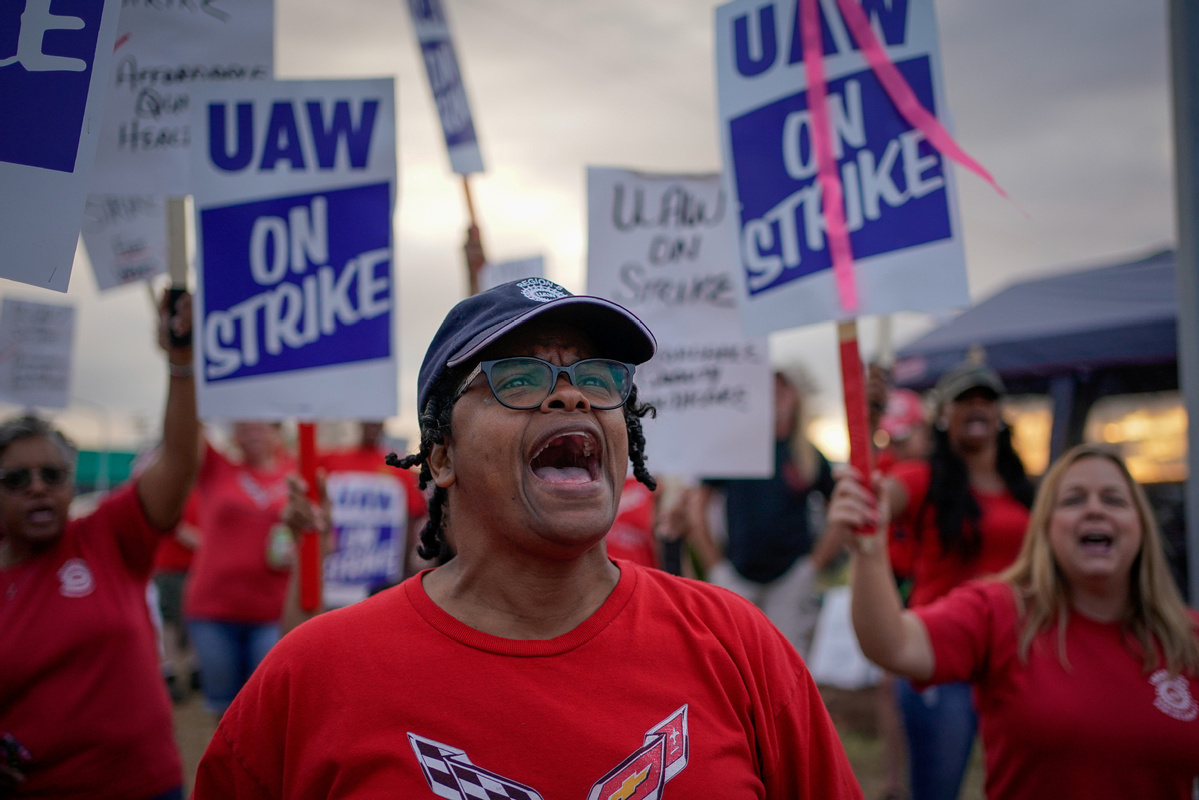GM strike talks focus on pay
By SCOTT REEVES in New York | China Daily Global | Updated: 2019-09-28 06:57

Job action starts to affect auto dealers, who are running low on parts for routine repairs
Auto dealers and customers across the nation are feeling the crunch of the continuing United Auto Workers (UAW) strike against General Motors, as parts for routine repairs are becoming increasingly difficult to find.
The strike by 46,000 workers entered its 11th day Thursday, the longest nationwide walkout against the automaker since 1970. A pay increase is the main unresolved issue, as the company agreed to continue to pay healthcare premiums while workers are on picket lines.
"GM has chosen to work with our providers to keep all benefits fully in place for striking hourly employees so they have no disruption to their medical care, including vision, prescription and dental coverage," Scott Sandefur, vice-president of labor relations for GM North America, said in a letter to UAW Vice-President Terry Dittes.
Democratic presidential candidates, other unions and the UAW had decried GM's decision to cut off health benefits.
"These irresponsible actions by General Motors are toying with the lives of hundreds of thousands of our UAW families," Dittes said in a letter to the company. "There is no doubt that public sentiment sees these actions of GM as a shameful act!"
GM said an initial decision to halt healthcare payments stemmed from uncertainty about who would cover the cost and was not a malicious act intended to punish strikers.
"Throughout (the) negotiations, GM has said that our number one focus was on the well-being of our employees," Sandefur said in a letter to the union. "That remains the case today."
Dealers have about a two-month inventory of new cars on lots, and so far the strike hasn't hurt sales, according to GM. But dealers no longer hold large inventories of replacement parts. Instead, parts are delivered as needed to cut costs.
The lack of parts has forced some dealers to turn customers away because small replacement parts such as spark plugs and oil filters aren't available. GM's 30 distribution warehouses are unionized, and the workers are on strike, halting the flow of parts to dealers. Some dealers have purchased parts from auto-supply stores, but that source is drying up as the strike continues, The Wall Street Journal reported.
"I probably have 30 to 40 repair orders on vehicles with parts on order and no estimated time of arrival," Keith Landerway, service adviser at Sawyer Chevrolet in Catskill, New York, told the newspaper.
A long strike will take a bite out of dealers' profits because service departments generate a strong cash flow. Last year, parts and service generated 43 percent of gross profits for publicly traded dealership groups, Moody's Investors Service reported.
The UAW's strike benefit is $250 a week, but payments don't begin until the 15th day of picketing. The starting wage for temporary production workers at GM is $15.78 an hour, or $631.20 per week, not including overtime.
GM's initial contract offer included a 2 percent wage increase in two of the contract's four years and a 2 percent lump-sum payment in the other years. The UAW rejected the offer.
The 2015 contract included a 3 percent wage increase and a 4 percent lump sum payment. GM asked workers to pay 15 percent of their healthcare costs, up from the 3 percent they now pay.
The union rejected that proposal, and GM has returned to the 3 percent contribution for health benefits, the Detroit Free Press reported, citing an unnamed person familiar with the negotiations.
Temporary workers now make up about 10 percent of GM's hourly workforce. The company said it needs flexibility to adjust the workforce to changing demand, but the UAW wants a clearly defined path for temporary workers to move to full-time status so they can receive better benefits.
The UAW contests GM's decision to idle assembly plants in Michigan and Ohio and transmission plants in Ohio and Maryland. The Free Press reported that GM has proposed to assemble electric vehicles in Detroit and produce batteries in Lordstown, Ohio.
Economists differ on the financial impact of the strike. Anderson Economic Group in East Lansing, Michigan, estimated that the first week of the strike would cost the economy $25 million, but Wall Street analysts peg the economic loss at $50 million or more per day.
























